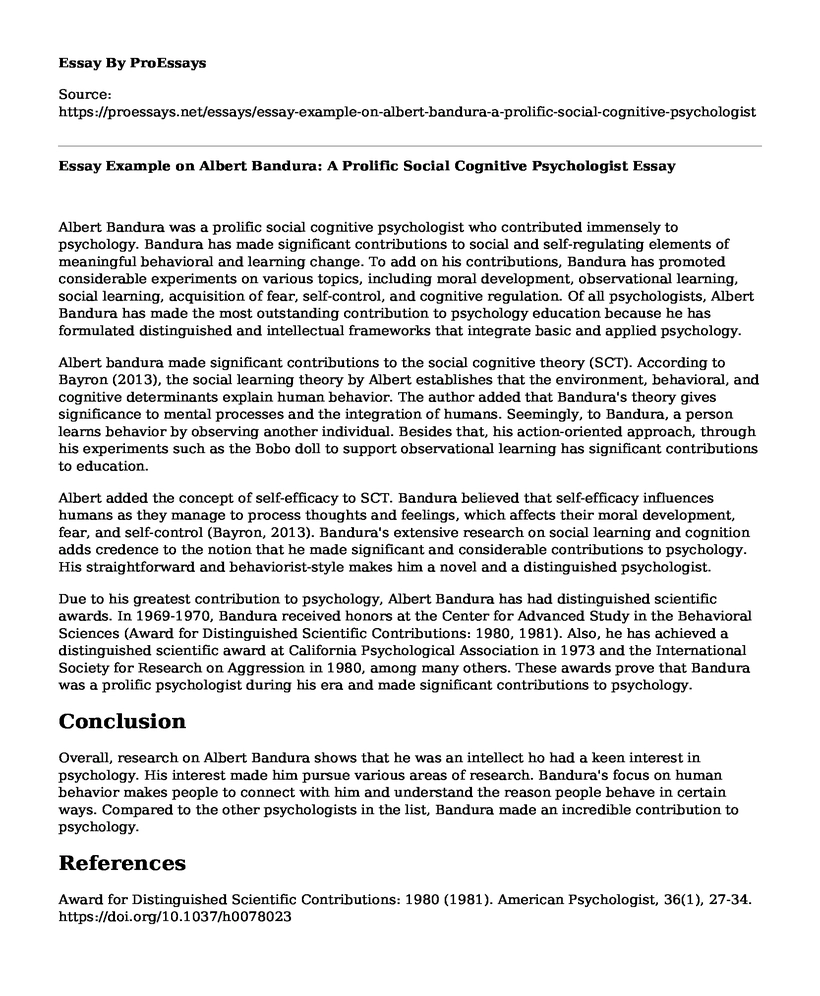Albert Bandura was a prolific social cognitive psychologist who contributed immensely to psychology. Bandura has made significant contributions to social and self-regulating elements of meaningful behavioral and learning change. To add on his contributions, Bandura has promoted considerable experiments on various topics, including moral development, observational learning, social learning, acquisition of fear, self-control, and cognitive regulation. Of all psychologists, Albert Bandura has made the most outstanding contribution to psychology education because he has formulated distinguished and intellectual frameworks that integrate basic and applied psychology.
Albert bandura made significant contributions to the social cognitive theory (SCT). According to Bayron (2013), the social learning theory by Albert establishes that the environment, behavioral, and cognitive determinants explain human behavior. The author added that Bandura's theory gives significance to mental processes and the integration of humans. Seemingly, to Bandura, a person learns behavior by observing another individual. Besides that, his action-oriented approach, through his experiments such as the Bobo doll to support observational learning has significant contributions to education.
Albert added the concept of self-efficacy to SCT. Bandura believed that self-efficacy influences humans as they manage to process thoughts and feelings, which affects their moral development, fear, and self-control (Bayron, 2013). Bandura's extensive research on social learning and cognition adds credence to the notion that he made significant and considerable contributions to psychology. His straightforward and behaviorist-style makes him a novel and a distinguished psychologist.
Due to his greatest contribution to psychology, Albert Bandura has had distinguished scientific awards. In 1969-1970, Bandura received honors at the Center for Advanced Study in the Behavioral Sciences (Award for Distinguished Scientific Contributions: 1980, 1981). Also, he has achieved a distinguished scientific award at California Psychological Association in 1973 and the International Society for Research on Aggression in 1980, among many others. These awards prove that Bandura was a prolific psychologist during his era and made significant contributions to psychology.
Conclusion
Overall, research on Albert Bandura shows that he was an intellect ho had a keen interest in psychology. His interest made him pursue various areas of research. Bandura's focus on human behavior makes people to connect with him and understand the reason people behave in certain ways. Compared to the other psychologists in the list, Bandura made an incredible contribution to psychology.
References
Award for Distinguished Scientific Contributions: 1980 (1981). American Psychologist, 36(1), 27-34. https://doi.org/10.1037/h0078023
Bayron, C. E. (2013). Social cognitive theory, entrepreneurial self-efficacy and entrepreneurial intentions: Tools to maximize the effectiveness of formal entrepreneurship education and address the decline in entrepreneurial activity. Revista Griot 6(1). https://revistas.upr.edu/index.php/griot/article/view/1624/1437
Cite this page
Essay Example on Albert Bandura: A Prolific Social Cognitive Psychologist. (2023, Jul 21). Retrieved from https://proessays.net/essays/essay-example-on-albert-bandura-a-prolific-social-cognitive-psychologist
If you are the original author of this essay and no longer wish to have it published on the ProEssays website, please click below to request its removal:
- Blood Glucose Levels Effect on Binge Eating Disorder Episodes
- Age-Related Effects and Medical Conditions That Affect Driving in Older Adults
- Research Paper on Causes of the 100 Years' War
- Movie Analysis Essay on "Mr. Polk's War"
- Research Paper on Event/Theory Impact to the Field Theory of ASD
- U.S. Population in 2030: Rising Older Generation Challenges Demographics - Essay Sample
- Violent Video Games and How There is No Proven Link between Them and Increased Aggressive Behaviors - Free Paper







